Related Research Articles

The Eurovision Song Contest 2004 was the 49th edition of the Eurovision Song Contest. It took place in Istanbul, Turkey, following the country's victory at the 2003 contest with the song "Everyway That I Can" by Sertab Erener. Organised by the European Broadcasting Union (EBU) and host broadcaster Turkish Radio and Television Corporation (TRT), the contest was held at the Abdi İpekçi Arena, and consisted of a semi-final on 12 May, and the final on 15 May 2004. The two live shows were presented by Korhan Abay and Meltem Cumbul. It was the first time Turkey had hosted the contest, 29 years after the country made its debut, and was also the first time since the 1998 contest in Birmingham that it was not hosted in the host country's capital city. It was the first Eurovision Song Contest held in a transcontinental country and city, in a Muslim-majority country and in a Turkic language-speaking country.

Sertab Erener is a Turkish singer, songwriter and composer. With her coloratura soprano voice, she started working as a backing vocalist for Sezen Aksu, and with Aksu's help she released her first studio album in the 1990s. Because of her education in classical music, she initially had difficulties in performing pop music. Although she did experimental works from time to time, she eventually preferred to focus on making pop music instead of making avant-garde works, in order to make her music heard by a larger audience. In some of her works, she combined Western music and Eastern music, and benefited from operas as well as classical Turkish music together with ethnic elements. With her entrance to Europe's market in the early 2000s, many of her works were also sold in Turkey as well as European countries.

Anjeza Shahini is an Albanian singer. She is best known for representing Albania at the 2004 Eurovision Song Contest in Istanbul, after winning the 42nd edition of Festivali i Këngës.

Ayşe Ajda Pekkan is a Turkish singer. She is known by the title "Superstar" in the Turkish media. Pekkan became a prominent figure of Turkish pop music with her songs, in which she tried to create a strong female figure. By keeping her works updated and getting influence from Western elements, she managed to become one of Turkey's modern and enduring icons in different periods. Her musical style has kept her popular for more than 50 years and has inspired many of her successors. Pekkan is highly respected in the music industry and her vocal techniques together with many of her albums were praised by music critics.

Manga is a Turkish rock band whose music is mainly a fusion of Anatolian melodies with electronic elements. In 2009, they won both the Best Turkish Act award from MTV Turkey and consequently the Best European Act award from MTV Networks Europe in MTV Europe Music Awards 2009. They represented Turkey at the Eurovision Song Contest 2010 with the song "We Could Be the Same" and took second place.
Ayşe Sibel Tüzün is a Turkish singer, songwriter and composer.

Hadise Açıkgöz is a Turkish-Belgian singer-songwriter, dancer, and television personality. Born and raised in Belgium, her family is of Lezgin-Kumyk origin who settled in Sivas, Turkey. In 2003, she participated in the Belgian singing competition show Idool 2003, but rose to fame after releasing her debut album Sweat in 2005. The album spawned 5 singles and earned Hadise both a TMF Award (Belgium) and Golden Butterfly Award (Turkey). Hadise established and maintained a successful career in both Belgium and Turkey with the release of her self-titled album Hadise (2008). The album, which includes English and Turkish songs, features the single "Deli Oğlan" that became a number-one hit in Turkey.

"7th Wonder" was the Maltese entry in the Eurovision Song Contest 2002, performed in English by Ira Losco. The song is composed by Philip Vella and written by Gerard James Borg.
Germany participated in the Eurovision Song Contest 2004 with the song "Can't Wait Until Tonight" written by Stefan Raab. The song was performed by Max. The German entry for the 2004 contest in Istanbul, Turkey was selected through the national final Germany 12 Points!, organised by the German broadcaster ARD in collaboration with Norddeutscher Rundfunk (NDR). The national final took place on 19 March 2004 and featured ten competing acts with the winner being selected through two rounds of public voting. "Can't Wait Until Tonight" performed by Max was selected as the German entry for Istanbul after placing first in the top two during the first round of voting and ultimately gaining 92% of the vote in the second round.

"I Can't Live Without Music" was the German entry in the Eurovision Song Contest 2002, performed in English by Corinna May.
Şebnem Paker is a Turkish guitarist, singer and music teacher.
Turkey was represented by Buket Bengisu & Group Safir with the song "Leylaklar soldu kalbinde".

"Sevgiliye Son" was the Turkish entry for the Eurovision Song Contest 2001. It was performed by Sedat Yüce. Sedat wore a white suit, and was accompanied by a violinist and a pianist, also dressed in white. The pianist was seated at a white piano.
Ayşegül Aldinç is a Turkish singer and actress.

"Leylaklar soldu kalbinde" was the Turkish entry in the Eurovision Song Contest 2002, performed in Turkish and English by Buket Bengisu & Group Safir.

Kejsi Tola is an Albanian singer and songwriter. She is best known for representing Albania at the 2009 Eurovision Song Contest in Moscow, after winning the 47th edition of Festivali i Këngës.
Emmy, is an Armenian singer. She is considered one of Armenia's most popular and influential singers, being labelled as a "pop princess" and "Armenian pop icon". Emmy represented Armenia in the Eurovision Song Contest 2011 and became the country's first non-qualifier, the others being Sevak Khanagyan in 2018 and Srbuk in 2019.

Can Bonomo is a Turkish singer of Jewish descent who represented Turkey in the Eurovision Song Contest 2012 in Baku, Azerbaijan.
Kids.il is an Israeli music group consisting of six child singers. They represented Israel in the Junior Eurovision Song Contest 2012 and they got 8th place, achieving 68 points.
Russia participated in the Junior Eurovision Song Contest 2016 which took place on 20 November 2016, in Valletta, Malta. The Russian broadcaster Russia-1, owned by the All-Russia State Television and Radio Broadcasting Company (VGTRK) was responsible for organising their entry for the contest. Sofia Fisenko won the national final on 16 August 2016 with the song "Zhivaya voda". On 6 October, the Russian organisation team opted to change the name of the entrant to Water of Life Project, with the song also changing to "Water of Life".
References
- 1 2 Telgraf, Ege (22 December 2011). "Eurovision'a 800 dolarlık harcırahla gittik". Röportaj. Milliyet.com. Archived from the original on 2 May 2014. Retrieved 21 August 2012.
- ↑ Bohlman, Philip V. (2004). The music of European nationalism. Santa Barbara, Calif.: ABC-CLIO. p. 2. ISBN 978-1-57607-270-7 . Retrieved 6 February 2011. "Eurovision Song Contest 2002". European Broadcasting Union. Retrieved 6 February 2011.
- ↑ "About Buket Bengisu & Saphire". eurovision.tv. Archived from the original on 24 September 2014. Retrieved 1 May 2014.
- 1 2 Durgut, Ali (November 2011). "Buket Bengisu EurovisionDream'de". Röportaj. eurovisiondream.com sitesi. Archived from the original on 29 April 2014. Retrieved 21 August 2012.
- ↑ "En iyi şarkı ödülü Türkiye'nin". Hürriyet. 18 May 2011. Retrieved 21 August 2012.